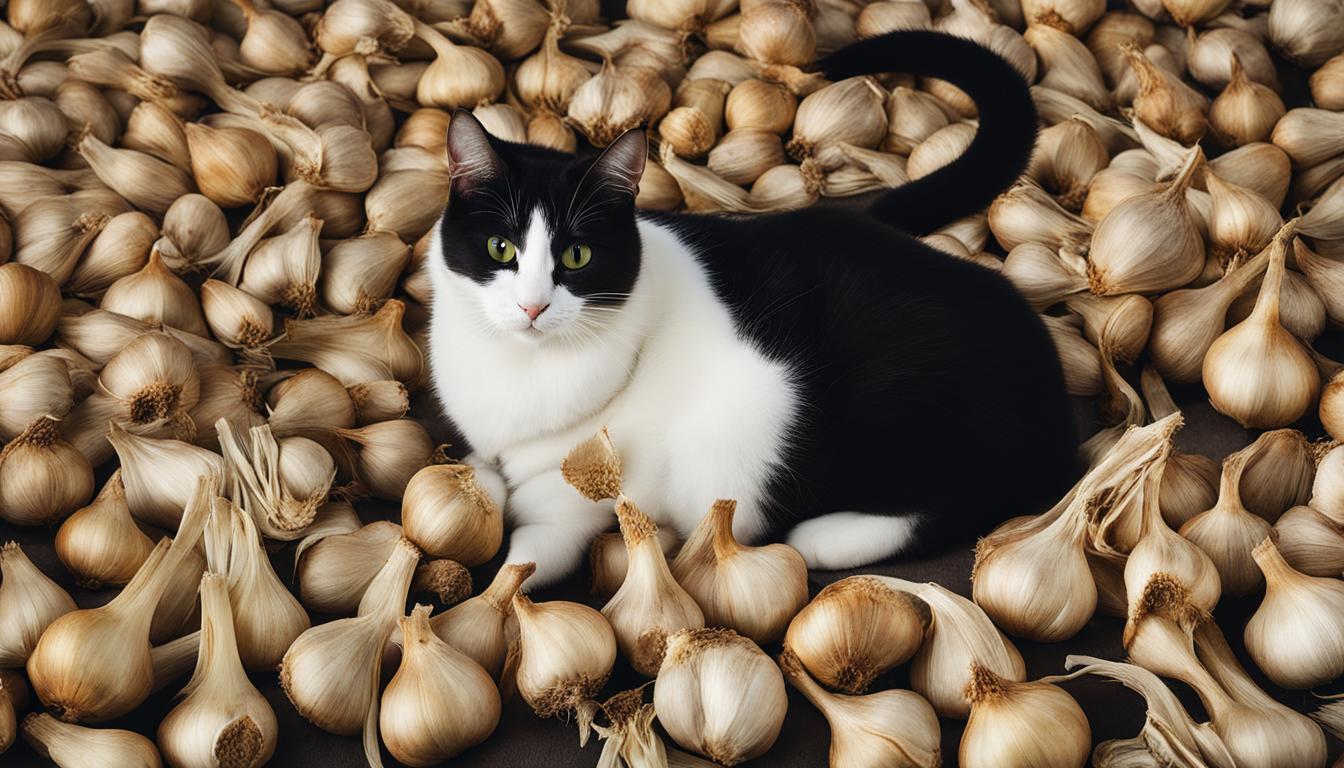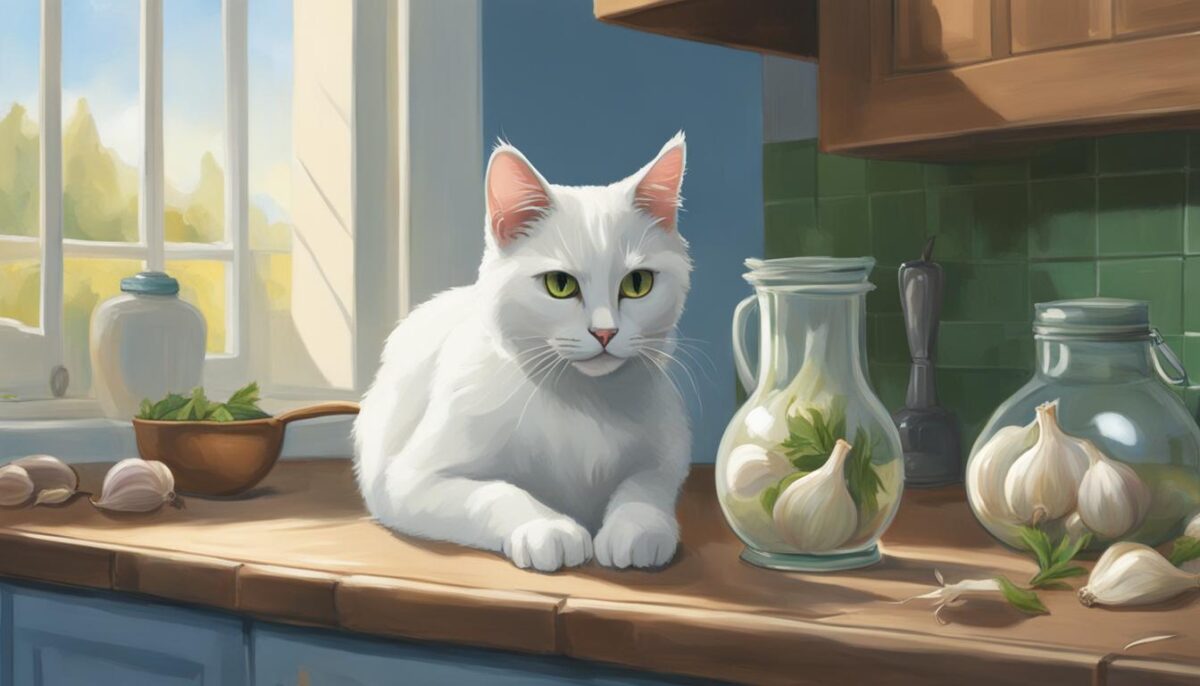Garlic is a common ingredient in many human dishes, but what about cats? Can cats eat garlic? According to multiple sources, including experts in veterinary medicine, garlic should be strictly avoided in a cat’s diet.
Garlic contains compounds that are toxic to cats, specifically N-propyl disulfide and thiosulphate. These compounds can cause damage to the red blood cells, leading to a condition called Heinz body anemia. In severe cases, garlic ingestion can even be fatal for cats. Therefore, it is essential for cat owners to ensure that their feline friends do not have access to any food containing garlic.
The Dangers of Garlic for Cats
Garlic may be a tasty addition to our meals, but it can be extremely dangerous for cats. If a cat ingests garlic, it can lead to oxidative damage in their red blood cells, causing a condition known as anemia. Symptoms of garlic poisoning in cats include weakness, lethargy, pale gums, rapid breathing, and loss of appetite. It’s important to note that even small amounts of garlic over time can accumulate and result in long-term health issues. Therefore, it is crucial for cat owners to be vigilant and ensure that their furry friends are kept away from any food containing garlic.
“Garlic can have severe consequences for cats if ingested,” warns Dr. Sarah Thompson, a veterinarian from the National Animal Hospital.
“The compounds found in garlic can cause damage to a cat’s red blood cells, leading to anemia. This can have serious ramifications for their overall health and well-being.”
If you suspect that your cat has ingested garlic or is showing any signs of garlic poisoning, it is essential to seek immediate veterinary attention. Garlic toxicity in cats can quickly escalate and become a medical emergency. Remember, prevention is always better than cure. Be mindful of the foods you offer your cat and ensure that garlic is never part of their diet.
Table: Symptoms of Garlic Poisoning in Cats
| Symptoms | Description |
|---|---|
| Weakness | Cat appears lethargic and lacks energy |
| Pale gums | Loss of healthy pink color in gums |
| Rapid breathing | Increased respiratory rate |
| Loss of appetite | Decreased or no interest in food |
Keep your feline companion safe and healthy by keeping them away from any food containing garlic. If you have any concerns or questions about your cat’s diet, always consult with your veterinarian for guidance and advice.
The Toxicity of Garlic to Cats
While many people enjoy the taste and aroma of garlic in their meals, it is important to note that garlic can be highly toxic to cats. The compounds found in garlic, such as N-propyl disulfide and thiosulphate, can cause serious health issues in feline friends. These compounds have the potential to damage a cat’s red blood cells, leading to anemia. As a responsible cat owner, it is crucial to understand the dangers of garlic and ensure that your beloved pet does not have access to any food containing garlic.
Garlic toxicity in cats can result in a range of symptoms and health complications. Gastrointestinal upset, including vomiting and diarrhea, is a common side effect of garlic ingestion. In severe cases, garlic can even cause organ failure and death. It is alarming to think that just one clove of garlic can be toxic to a cat, given their small size. Therefore, it is essential to be cautious and avoid feeding any food that contains garlic to your furry friend.
To protect your cat’s well-being, it is important to be aware of the potential sources of garlic in their environment. Some cat owners may not realize that certain human foods, such as garlic bread, pasta sauce, or even baby food, can contain garlic. Additionally, garlic can sometimes be an ingredient in alternative medicine or herbal remedies, so it is crucial to read labels carefully and consult with a veterinarian if you have any concerns.
The Dangers of Garlic for Cats
As we’ve discussed, garlic can have severe consequences for cats if ingested. It is essential to remember that what is safe for humans may not be safe for our feline companions. Even in small amounts, garlic can accumulate in a cat’s body over time and cause long-term damage to their health. The best course of action is to avoid feeding cats any food containing garlic altogether.
| Signs of Garlic Poisoning in Cats | Steps to Take |
|---|---|
| Weakness, lethargy | Seek immediate veterinary attention |
| Pale gums, rapid breathing | Do not induce vomiting unless instructed by a veterinarian |
| Loss of appetite | Monitor your cat closely for any worsening symptoms |
By being proactive and avoiding any potential exposure to garlic, you can keep your cat safe and healthy. Remember, if you suspect your cat has ingested garlic or is showing any signs of garlic poisoning, seeking veterinary care immediately is essential. A veterinarian will be able to provide appropriate treatment and guide you on how to support your cat’s recovery.
Cats and Garlic: Understanding the Risks
It is crucial for cat owners to understand the risks associated with feeding their cats garlic. While some foods may be safe for humans, they can be highly toxic to cats. Garlic contains compounds that can damage a cat’s red blood cells, leading to anemia. Even small amounts of garlic can have a cumulative effect, causing long-term health issues. It is best to err on the side of caution and avoid feeding cats any food containing garlic.
If you suspect that your cat has ingested garlic or is showing any signs of garlic poisoning, it is important to seek veterinary care immediately. The sooner your cat receives medical attention, the better the chances of a successful outcome. Remember, cats cannot tolerate garlic like humans can, so it’s always better to be safe than sorry.
Signs of Garlic Poisoning in Cats
Garlic poisoning in cats can manifest through various symptoms, including:
- Weakness and lethargy
- Pale gums
- Rapid breathing
- Loss of appetite
If you notice any of these signs or suspect that your cat has consumed garlic, don’t wait for the symptoms to worsen. Contact your veterinarian immediately for guidance and advice on the appropriate course of action.
As responsible cat owners, it is our duty to prioritize the health and well-being of our feline companions. This means being aware of the potential dangers of certain foods, such as garlic, and taking proactive measures to keep our cats safe. By understanding the risks associated with garlic and avoiding it in our cats’ diet, we can help ensure their long and healthy lives.
| Signs of Garlic Poisoning in Cats | Actions to Take |
|---|---|
| Weakness and lethargy | Contact a veterinarian immediately |
| Pale gums | Seek veterinary care for diagnosis and treatment |
| Rapid breathing | Do not delay – consult a veterinarian as soon as possible |
| Loss of appetite | Ensure immediate veterinary attention |
Conclusion
In conclusion, it is important to understand that cats should not eat garlic. While garlic may be a common ingredient in many human dishes, it is not safe for cats to consume. Garlic contains compounds that are toxic to cats and can lead to serious health issues, such as anemia.
Even small amounts of garlic can be harmful to cats, so it is best to completely avoid feeding them any food containing garlic. As responsible pet owners, our duty is to keep our cats safe and healthy by providing them with a well-balanced diet free from any potentially harmful ingredients like garlic.
If you have any concerns about your cat’s diet or health, always consult with a veterinarian. They can provide the best guidance and ensure that your cat receives the proper care. Remember, your cat’s well-being should always be a top priority.
FAQ
Can cats eat garlic?
No, cats should not eat garlic. Garlic contains compounds that are toxic to cats and can cause damage to their red blood cells.
What happens if a cat ingests garlic?
If a cat ingests garlic, it can lead to Heinz body anemia, which is a condition where the red blood cells are damaged. In severe cases, garlic ingestion can even be fatal for cats.
What are the symptoms of garlic poisoning in cats?
Symptoms of garlic poisoning in cats may include weakness, lethargy, pale gums, rapid breathing, and loss of appetite.
How much garlic is toxic to cats?
Even small amounts of garlic can be toxic to cats. As little as one clove of garlic can have harmful effects on a cat’s health.
Can a small amount of garlic over time be harmful to cats?
Yes, even small amounts of garlic over time can accumulate and cause long-term damage to a cat’s health.
What should I do if my cat ingests garlic?
If you suspect that your cat has ingested garlic or is showing any signs of garlic poisoning, it is important to seek immediate veterinary care.
Why should cats avoid garlic?
Cats should avoid garlic because it contains compounds that can damage their red blood cells, leading to anemia and other serious health issues.
How can I ensure my cat does not eat garlic?
As a responsible pet owner, it is important to keep any food containing garlic out of your cat’s reach and to be vigilant about checking ingredient labels.

